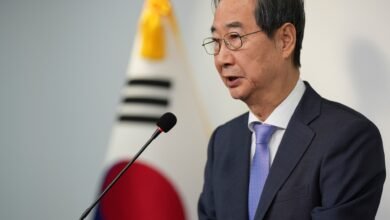Michel Barnier’s journey from Mr Brexit to French PM

In July 2016, a month after the UK voted to leave the EU, Mr Juncker – who said he wanted an “experienced politician for this difficult job” – picked Mr Barnier to negotiate the Brexit deal.
His nomination was a surprise for some of Mr Barnier’s fellow Frenchmen, who had never held him in particularly high esteem. Only a few years earlier, a journalist from French paper Libération had famously said that Mr Barnier – by then a veteran politician – would always just be a “nice, white-teethed skier, ever so intellectually limited”.
On the EU side, however, Mr Barnier was well known for being diligent and methodical. Crucially, he was also seen as cool-headed – a valuable trait during the first febrile months after the Brexit referendum.
Throughout the gruelling Brexit process he had to work with an ever-changing cast of British negotiators and prime ministers, but Mr Barnier remained largely unflappable, facing what he repeatedly called a “costly and painful divorce”.
Although he was most often pictured sitting around negotiating tables in Brussels or London, much of the work to disentangle the UK from the EU was done by Mr Barnier’s staff. Behind the scenes, his chief task was to travel around Europe and build consensus among the 27 member states to ensure the EU maintained a united front.
In the process, he became a familiar sight on TV screens on both sides of the Channel and beyond – tall, sleek and debonaire, generally flanked by an EU flag and typically inscrutable.
There was little emotion in his voice when, seamlessly switching from English to French, he announced on 24 December 2020 that the EU and the UK had reached a post-Brexit trade deal.
Mr Barnier – ever fond of hiking metaphors – had once likened Brexit to climbing a mountain. Soon after that peak was conquered, he began his ascent to the next one.
In the summer of 2021, he launched a bid to be conservative candidate in the 2022 French presidential election, sparing no criticism of President Emmanuel Macron, who he said had ruled France in an “arrogant” manner.
Away from Brussels, Mr Barnier began to shed his image of a consummate EU technocrat.
He called for staunch anti-immigration policies to be implemented in France and across the EU, and said France should be able to ignore certain rulings of the European Court of Justice and the European Court of Human Rights. Some observers were surprised, and interpreted this as populist move.
Others felt Mr Barnier was merely heeding the lessons of Brexit and keeping an eye on the mood of voters.
Source link



